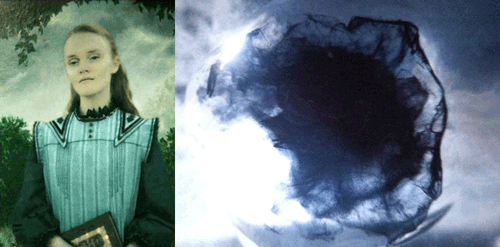To Be The Villain
The film "The Dark Knight Rises", while having nothing in common with HARRY POTTER AND THE CURSED CHILD, championed an interesting phrase: "You either die a hero, or live long enough to see yourself become the villain."
To me, as sad as it sounds, this is what has happened to J.K. Rowling.

Her journey from obscurity to the most famous author of all time so mirrored the main character of her book that she was an intriguing interview. And like the reporters of the imaginary Daily Prophet, interviewers pushed her for as much information as she could spit out, quite aggressively, all attempting to scoop one another, and coerce the soft-spoken, confessed housecat to tell all under the bright lights and in front of massive, expectant crowds. No one, not one of us, can know what that truly feels like. And, out of this process, incorrect statements are likely to happen. The longer it goes on, the more hardened, certain, and even obstinant an individual could become. Someone of her subdued nature may even resemble something new. An Obscurus, perhaps? So, we should give her some leniency when it comes to the direction in which she has taken the franchise.
Once the seven books were completed, the need to answer fan queries and hard-hitting interview questions was so intense that it led JKR to update character backstories and create new scenarios and controversies with fancy tidbits (some that seemed based in the social craze of the moment). It started innocently, and the draw was always there. She wanted to keep her fans happy. And, of course, she still loved Harry. I should add that I'm not frustrated at all by JKR's choice to take the canon in different directions. I think it rounds out the world nicely, and have borrowed some of those details in my own writing. But her post-facto musings often deconstructed previously defined framework from the novels instead of adding to the story. And that's not cool.
This begs the question, will the books ever be closed to revisionist thinking? Cursed Child pressed this question by challenging our impressions of established characters. And not necessarily in a good way. This is the hallmark of an artist who will never be satisfied. An artist who wants to control the interpretation of their work to the point that it takes the story in directions that eliminate the potential for the all-important "head canon" to exist. How is this possible? Because her opinion holds a lot of weight with the fans and spreads rapidly.

Imagine that we were all at an art gallery, enjoying a painting. You say, "This makes me think of *insert interesting, creative imagery*."
Then I say, "Really? Wow. How interesting and creative. This makes me think of *insert equally interesting, creative imagery*."
Then the original artist walks up to us and says, "No, you're both wrong. It's supposed to mean *insert bland explanation*. And to stop anyone else from thinking otherwise, I'm going to plaster my explanation here on the wall below the frame. Good day."
At some point over the past two decades, a line was crossed. JKR stepped between us and her books, making the novels more about what continues to go on in her mind rather than the story of her characters. Books are a form of art. Art has a level of interpretation built into the medium. The work of art then belongs to both the artist and the viewer, as they share in the experience. Authorial input or correction is an overstep, whether or not some spectators appreciate that input. It is an act of wrestling control away from the public. When the artist / author fails to acknowledge or appreciate their role in the public enjoyment of the work, they run the risk of causing divisions in their fanbase, ruining the experience, and becoming a traitor to their own fandom.
Books work differently than any other storytelling medium because authors have built-in limitations that allow the reader to use their imagination. If a particular question is answered, that authorial power overwrites all other interpretations connected to that exquisite, sometimes intentional question.

Example: Is Ariana Dumbledore an Obscurial?
Well, the facts seem to be pointing in that direction based on the first Fantastic Beasts movie, but I never saw Ariana that way and the concept didn't exist at the time of Deathly Hallows, so she isn't an Obscurial in my mind. Even if she turns out to be one in the upcoming FB films (WW-Canon). However, according to the books (OS-Canon), Ariana's ability to control magic was affected after being attacked by Muggle boys as a child. This led to her accidentally killing her own mother. Left within the framework of the books, that wild, uncontrolled nature can be interpreted however the reader chooses.
Books are unique in that they are one part a story and one part a vivid, personal daydream. We authors already control the story part. It's not fair for us to control the daydream.
JKR knows this. In fact, when she once said "within a novel, you have to resist the urge to tell everything," she was referencing the Epilogue from Deathly Hallows. And yet, she went on to keep the story going beyond the void of our daydreams, contradicting her own intentions with the original books. Why would she do such a thing? I'll get to that in the next post.
As fans, we've gotten personal engagement, apologies for deaths, and arbitrary explanations by the week, sometimes by the day, about a fantasy series that was finished when Justin Timberlake's solo career was just getting off the ground. Wow, I feel old. This sort of engagement and tweaking begins to wear out a franchise. And while some of the fans could never get enough, even the New York Times has noted that J.K. Rowling "just can't let Harry Potter go." And they weren't the only ones.

The connection to George Lucas of Star Wars is an easy one. He tinkered with the original movies to the point that it risked destroying what made fans fall in love with the franchise in the first place. Some of that desire comes from being an author. Stephen King, who says that there are certain characters who take up residence in his head, empathizes with her reasoning.
"I think she likes the Harry Potter people, and it's a little bit hard for her to let go. And she's aware that there are millions and millions of people who loved those books. Writers feel responsibility to their readers, and some of that is a way of saying to the fans, 'If you want a little more, I'll give you a little more.'"
Steven Spielberg said it best in his reasoning for the success of the film "Jaws". It relied on the imagination of the filmgoer.
"Jaws is scary because of what you don't see, not because of what you do. We need to bring the audience back into partnership with storytelling."
This retrospective is coming to a close. And I don't mean to always come down so hard on JKR. To be honest, I'm still a huge fan and feel like she's less at fault for this than others. My endless lecturing can be best described in a quote by Albus Dumbledore from Philosopher's / Sorcerer's Stone:
IT TAKES A GREAT DEAL OF BRAVERY TO STAND UP TO YOUR ENEMIES. BUT A GREAT DEAL MORE TO STAND UP TO YOUR FRIENDS.
As a fan of J.K. Rowling, and as one of her allies, I can confidently say that JKR's biggest adversary is herself. Her inability to withhold all of those unknowns, by answering questions that could have encouraged discussions and stimulated daydreams, she slowly hollowed out everything we once valued about her story. Instead of leaving us with a simple Epilogue that teased the future of our favorite characters, on the train platform with their children who were moments away from embarking on a journey of their own, as if the novel itself was telling the reader that it was okay to be finished, that we had a whole world of new stories out there to enjoy... she wrenched the lasting magic away from her own book. Instead of going out on top, when all of us were satisfied, satiated, and serene, she kept going... until we were unnecessarily underwhelmed with the boy who lived.
You either die a hero, or live long enough to see yourself become the villain.
At least, that's how it seems. But she can't take full credit for Epilogue 2: What Happens Next. In fact, my love for her urges me to extend the olive branch on Cursed Child. I think this got out of hand the moment she brought in the creative team. When the name on the cover of the script book went from J.K. Rowling to J.K. Rowling and...

Bạn đang đọc truyện trên: Truyen247.Pro